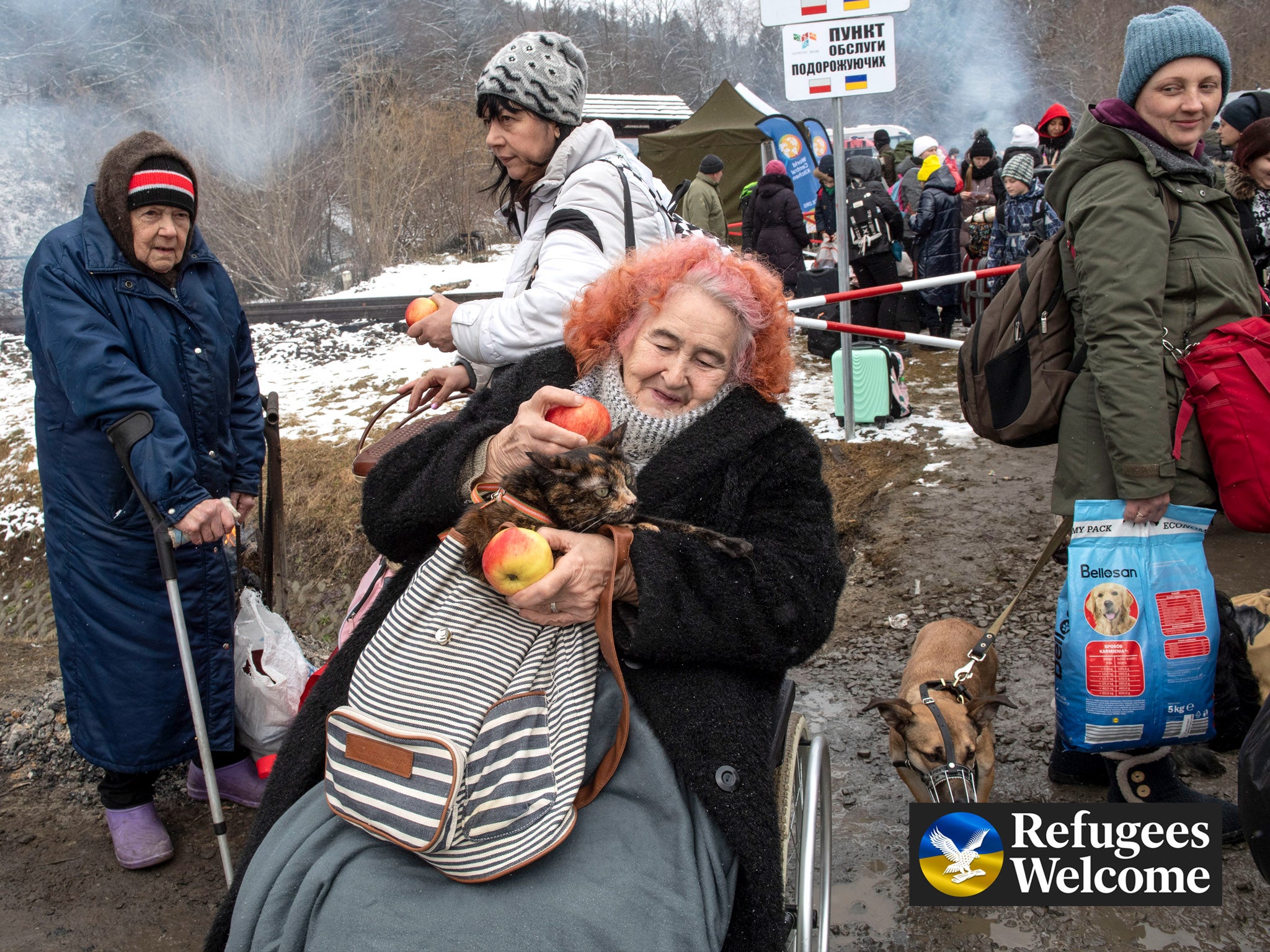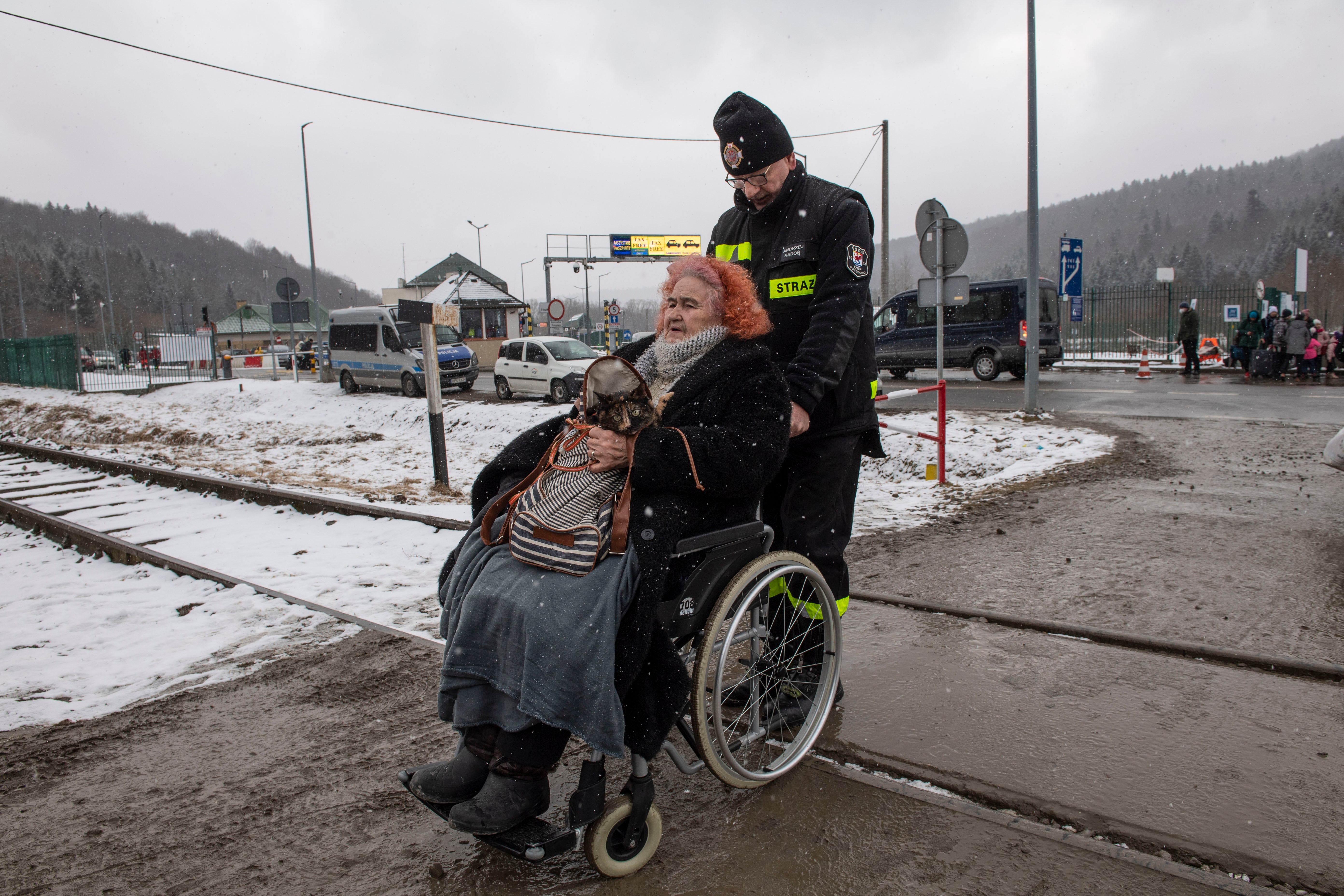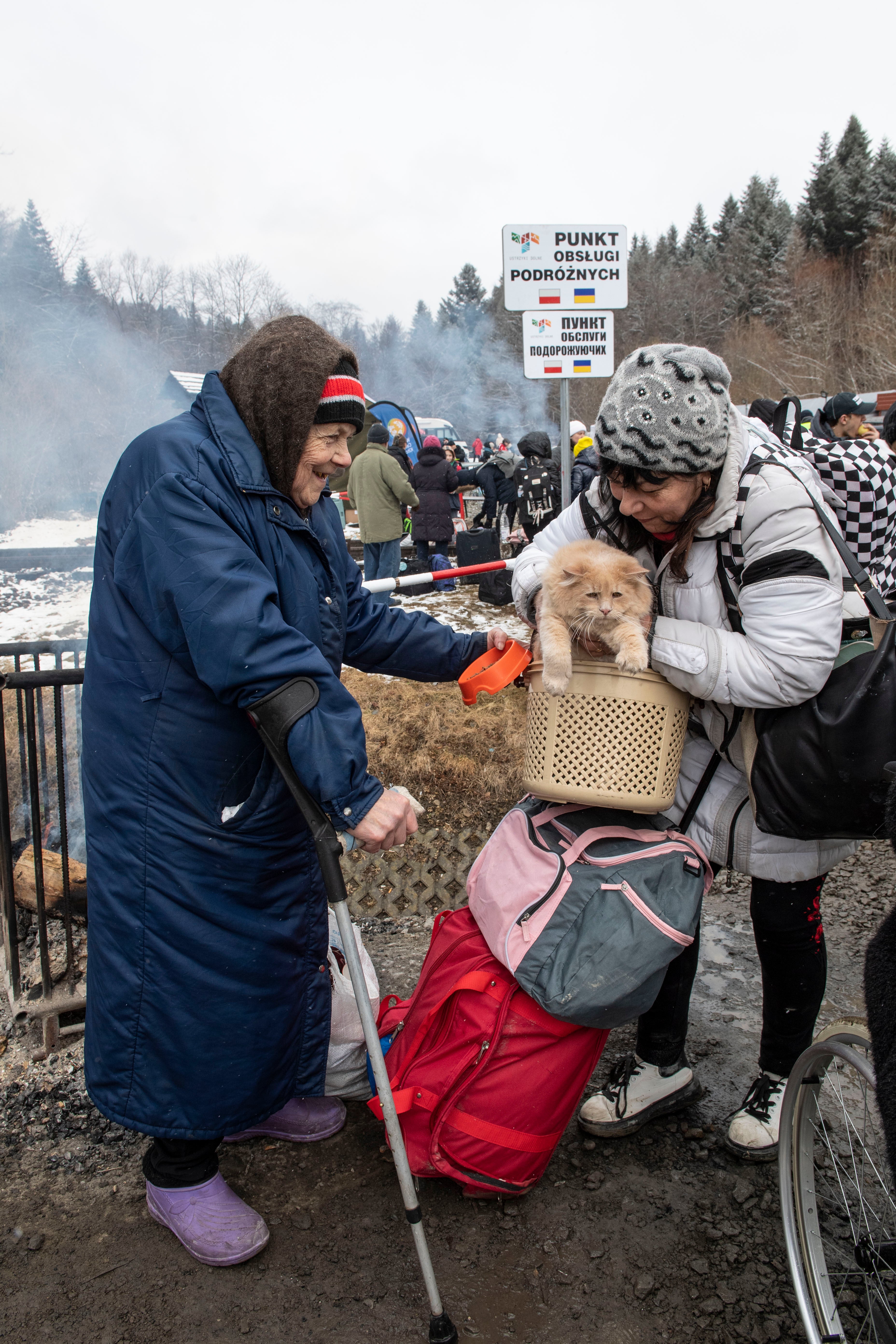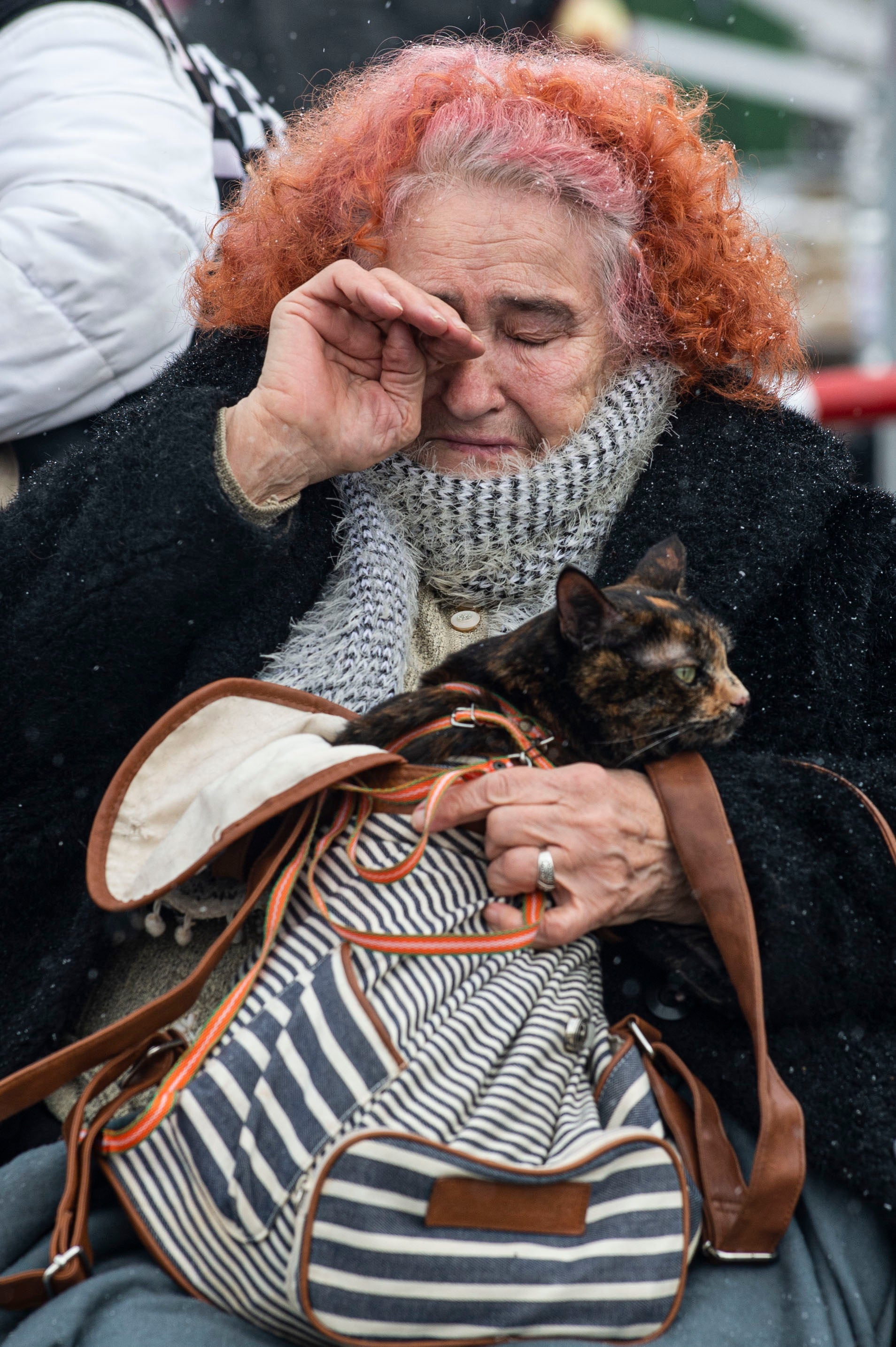Meet the grandparents trying to escape Ukraine: ‘I lived through the Second World War. And now we have this’
Refugees Welcome: The elderly living in war-torn Ukraine are often unable to leave their homes. David Cohen meets two grandmothers who, with the help of their daughters, managed to reach the Polish border

Your support helps us to tell the story
From reproductive rights to climate change to Big Tech, The Independent is on the ground when the story is developing. Whether it's investigating the financials of Elon Musk's pro-Trump PAC or producing our latest documentary, 'The A Word', which shines a light on the American women fighting for reproductive rights, we know how important it is to parse out the facts from the messaging.
At such a critical moment in US history, we need reporters on the ground. Your donation allows us to keep sending journalists to speak to both sides of the story.
The Independent is trusted by Americans across the entire political spectrum. And unlike many other quality news outlets, we choose not to lock Americans out of our reporting and analysis with paywalls. We believe quality journalism should be available to everyone, paid for by those who can afford it.
Your support makes all the difference.Eighty-seven year-old Tetyana Vatazhok leaned heavily on her crutches and set her face defiantly against the freezing cold as snow fell all around her.
She gazed out in silence as her younger friend, 85-year-old Zhanna Zabrodska, sat immobilised in a wheelchair alongside. Zhanna clutched a rucksack on her lap from which her cat Masha peaked out.
“Come feel my bag,” she said. “Come and feel Masha shivering through the bag”. Tears streamed down Zhanna’s cheeks. “This is too much,” Zhanna said.
“As a child, I lived through the Second World War. And now we have this.”
She gestured to the queue of Ukrainian refugees full of exhausted mothers and children who had made it here to Kroscienko on the Polish side of the border crossing – and were waiting for transit to a reception centre where warmth and hot food awaited them.
“The Russians are same as the Germans then. I see them as Gestapo,” she said.
The Independent is raising money for the people of Ukraine – if you would like to donate then please click here for our GoFundMe page.
So far our appeal has raised £126,000 for the people of Ukraine, but they need more, please give what you can to help support them.
Zhanna and Tetyana had travelled from their bombed-out city of Kharkiv and had been en route for more than two days. They were accompanied by their their daughters, Veronica, 47 and Vita, 54, respectfully, and their cats Masha and Syoma. Their grandchildren, they said, thankfully no longer lived in Ukraine.
Grandparents are conspicuous at the border mostly because there are so few of them. The difficulty of enduring such an extremely arduous journey is reason enough.
In Zhanna’s and Tetyana’s case, they had severe disability, diabetes, hearing loss and a myriad of other medical ailments to contend with. Why did they come?
Veronica said: “We were hiding in the basement for 11 days since the war began. The bombing was intense and non-stop. My mother lives on the 9th floor of an apartment block and Tetyana lives in the neighbouring building, but the elevators no longer worked so they couldn’t get back to their flats. They were stuck in those freezing basements because the electricity had been cut off by the Russians and there was no heat, no light, no water – and we started running out of food as well.

“We heard about people in our town who went to the shops to buy food and got killed by the Russians, so we were too scared to go anywhere. The yard was covered with bomb parts and all around buildings have been destroyed. You cannot believe this has happened to the city you love. Things got so bad in that basement that we realised we couldn’t stay because our mothers could die of cold. But also, we couldn’t go because it was dangerous and there was a chance they weren’t strong enough to make it. So we faced a dilemma. A terrible choice. In the end we decided to try make it to safety.”
They waited for the Ukrainian checkpoint guards to tell them it was okay to leave and joined a convoy to the railway station where they boarded a train to Lviv.
“We left on 7 March, we were 8 March in Lviv and 9 March at the Polish border.” It was at the border, added Veroncia that her mother had been in danger of collapsing and aid volunteers had given her a wheelchair.
Ahead of them a sign said, “welcome to the European Union”, but their conversation was mostly about the people they had left behind. Vita passed me her phone pointing to a text message from her friend’s children who had fled Kharkiv to a nearby town called Balakliya, hoping it would be better.
I don’t want to talk about my feelings because I will cry
The text said: “Can’t go anywhere. We are now occupied.” How did they feel having made it to safety?
“I don’t want to talk about my feelings because I will cry,” said Veronica. “You can’t tell it with words. We’re still in shock from the very beginning of the war because it was so unexpected.”
As we spoke, a Polish fire volunteer (the firemen have been extraordinary) wheeled Zhanna through the muddy slush to the front of the queue, priority being given to the elderly disabled.
Her scarf was wrapped tightly around her neck and over her legs Veronica had draped a blanket, now wet from the snow. An observant Polish photographer noticed Zhanna’s hands were exposed, so he took off the black leather gloves he was wearing and gave them to her.

An aid worker from World Central Kitchen offered the grandmothers apples. They took two each.
After 20 minutes, a transit van arrived, but it had no facility to load wheelchairs, so young mothers and children piled on instead.
One of the people waiting to board was Maria, an 18-year-old in a long flowing coat and high boots who had travelled on her own from Kyiv and who stood out because of her acute fashion sense, despite having fled 24 hours ago from Kyiv.
But Maria also stood out because she exuded a red-hot anger and defiance. “At this point, I am so emotionally drained that I don’t think anything,” she said.
“This is not something I thought I would ever experience in my life. I didn’t want to leave and I stayed as long as I could. I left behind my boyfriend and so many people I love, including my elderly relatives.”
She looked at Zhanna and Tetyana but it was not clear she even saw them.
“I am very, very tired, but I can tell you this. We will be going back to Kyiv. I have no doubt. None.”
The Independent has set up a petition calling on the UK government to be at the forefront of the international community offering aid and support to those in Ukraine. To sign the petition click here.
We want to get 200,000 signatures as soon as we can to help put as much pressure on the government as possible, please add your support today.
Suddenly into their midst, stepping out of a Red Cross van, swept a ball of energy handing out soft toys and bringing the first smiles of the day to the faces of children.
It was the mayor of Jaslo, Elwira Musialowicz-Czech, 45, who had travelled from her town about 100km away to drop three vans of aid at the border to be picked up by the mayor of a town they twinned with in the Ukraine.
I asked about their link to the Red Cross – one of the 13 charities our Refugees Welcome appeal is funding – and she said: “ We are collaborating with the Red Cross because they are the experts in the field who know what is needed and because the Red Cross sign is one recognised all over the country as a sign of good people caring.
We are working with them to take what is needed now – electricity generators, baby food, first aid kits and medicines. And we will be here same time tomorrow. And the day after. Until this terrible thing is over.”

An hour later, Tetyana and Zhanna were still waiting for a transit at the front of the queue. Where would they go? Zhanna shrugged. “We don’t know,” she said. The snow fell. Tears still rolled down her cheeks.
Additional reporting, translating, by Sofiia Sas
The Independent has a proud history of campaigning for the rights of the most vulnerable, and we first ran our Refugees Welcome campaign during the war in Syria in 2015. Now, as we renew our campaign and launch this petition in the wake of the unfolding Ukrainian crisis, we are calling on the government to go further and faster to ensure help is delivered. To find out more about our Refugees Welcome campaign, click here. To sign the petition click here. If you would like to donate then please click here for our GoFundMe page.
Join our commenting forum
Join thought-provoking conversations, follow other Independent readers and see their replies
Comments